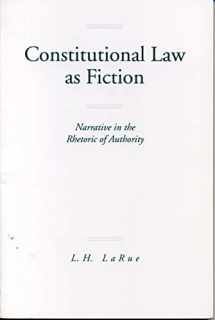
Constitutional Law as Fiction: Narrative in the Rhetoric of Authority
Book details
Summary
Description
The fundamental thesis of Constitutional Law as Fiction is that in writing the opinion that explains a judgment, a judge not only analyzes and organizes precedent and makes and defends policy or value judgments, but he or she also tells a story, much as a historian does.
Like a history, this story has the appearance of simple truth, but, in fact, of necessity, it is a "fiction" as well—not in the sense of a lie or fairy tale, but in the sense of a constructed meaning. Strangely enough, these fictions persuade those who read them and those who write them, and without this persuasion, the law would lose much of its authority. L. H. LaRue examines several critical Supreme Court cases, including Everson v. Board of Education and Marbury v. Madison, and specifically examines the rhetorical techniques of Chief Justice John Marshall.
In analyzing the construction of meaning in the rhetoric of the law, LaRue ultimately contends that judges must not abandon the "fictions" in their judgments; they must strive to improve them.


We would LOVE it if you could help us and other readers by reviewing the book
Book review



